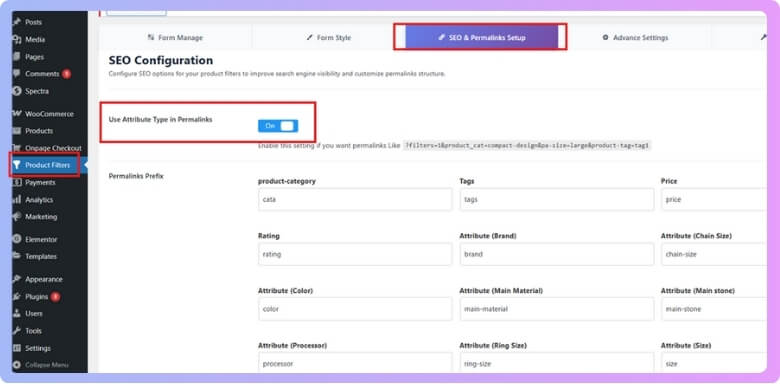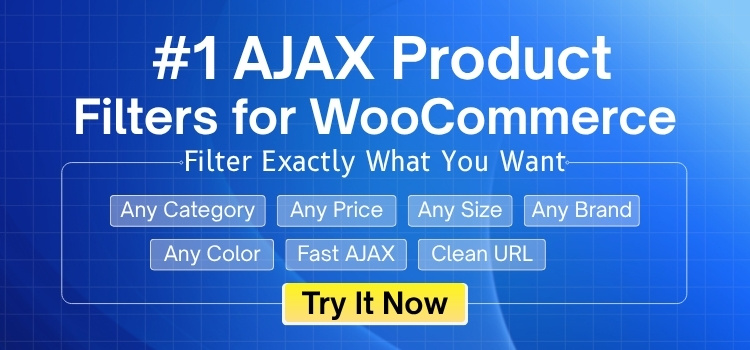Indexing plays a big role in how search engines understand and display websites. For online stores, especially those with many products, indexing decides which pages get seen and ranked. Many store owners often wonder can filters be indexed by google in WooCommerce stores?
Yes, filters in WooCommerce stores can be indexed by Google if you enable the right SEO settings. Use the Dynamic AJAX Product Filters for WooCommerce plugin, turn on SEO mode, and activate indexable filter links. This setup helps your filtered pages appear in search results without needing any coding skills.
If you are curious about how filters affect your store’s SEO, this article will guide you through everything in detail. Here, you will find step-by-step instructions, clear explanations, and practical tips. Each section explains what you need to know to make the right choices.
Can Filters Be Indexed by Google in WooCommerce Stores?
Yes, filters in WooCommerce stores can be indexed by Google, but it requires specific settings and adjustments. The good news is that you do not need coding skills to do this. With the help of the right plugin, the process becomes simple and user-friendly. You can even choose between a free and paid version depending on your needs.
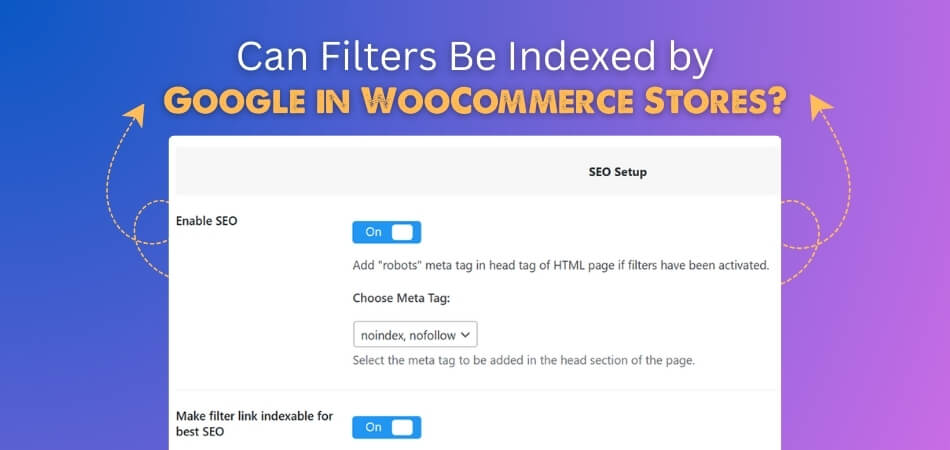
Step 1: Install the Plugin
To make filters indexable, you first need to install a plugin that supports SEO-ready product filters. One of the easiest to use is Dynamic AJAX Product Filters for WooCommerce, which allows you to set things up without touching code. You can install it directly from your WordPress dashboard or upload it manually if you prefer. Here’s how to do both methods step-by-step.
Option A: Install From WordPress Dashboard
- Go to your WordPress Admin Dashboard.
- Click on Plugins.
- Select Add New Plugin.
- In the search bar, type Dynamic AJAX Product Filters for WooCommerce.
- Find the plugin and click Install Now.
- After installation, click Activate.
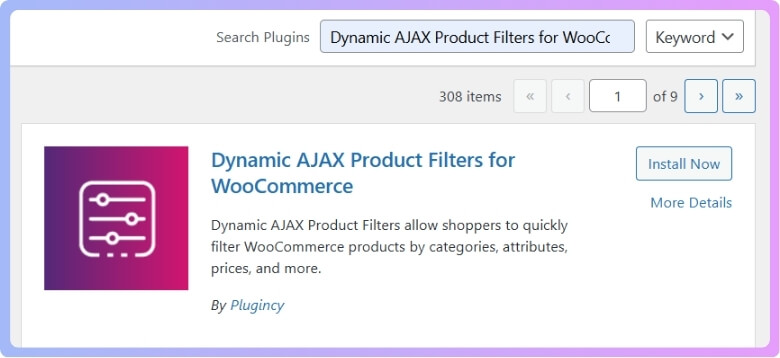
Option B: Install Manually
- Download the plugin ZIP file from the WordPress directory or from the official website.
- Open your WordPress Admin Dashboard.
- Go to Plugins.
- Click on Add New Plugin.
- Select the Upload Plugin.
- Click Choose File and select the downloaded ZIP file.
- Click Install Now.
- After installation, click Activate.
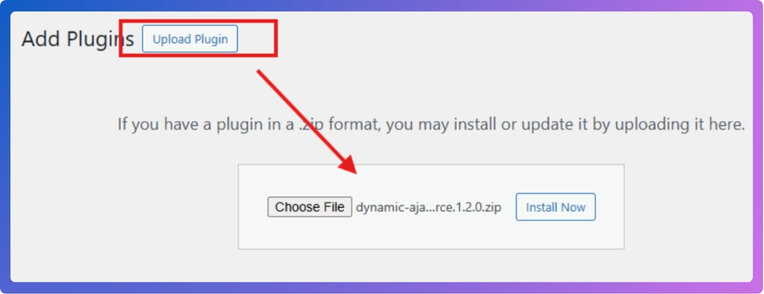
Activate Premium Version (if purchased)
If you decide to go with the premium version, you will need to activate your license key. This gives you access to extra features that help with SEO and customization. The process is quick and only needs to be done once.
- After purchasing, you will receive a license key.
- Go to Product Filters > Plugin License.
- Paste your license key in the given field.
- Save it to activate premium features.
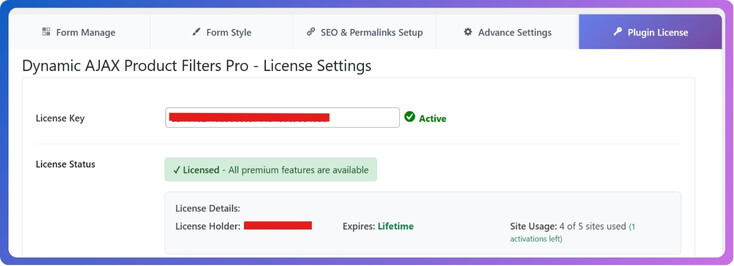
Step 2: Make Filters Indexable by Google
Once the plugin is active, you can now adjust the SEO settings so that filters can be crawled and indexed by Google. These settings are important because they tell search engines how to treat your filter links. To enable indexing, simply follow these steps.
- Go to Product Filters > SEO & Permalinks Setup.
- Turn on Use Attribute Type in Permalinks (optional if you want more detailed permalinks).

- Scroll down to the SEO Setup section.
- Turn on Enable SEO.
- Turn on the Make filter link indexable for best SEO.
- Click on Save Changes.
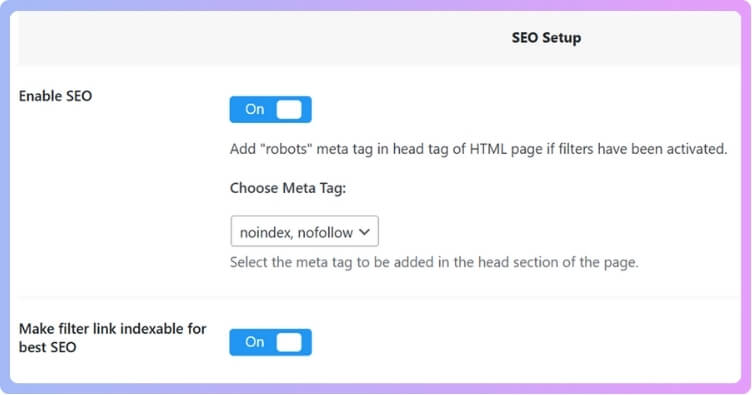
These steps give a simple breakdown of how to install, activate, and set up filters so they can be indexed by Google. Following each part carefully will make sure your store is ready and fully optimized.
How Does Google Treat Filtered Pages in WooCommerce?
WooCommerce stores often face the issue of filtered pages creating multiple versions of the same content. These variations can confuse search engines if not handled properly. The way Google deals with them affects rankings, crawl activity, and overall visibility. Let’s look deeper.
Filtered URLs
Filtered URLs are created when shoppers sort products by price, color, or other options. Google may treat these as separate pages, even though they hold mostly similar content. This can lead to hundreds of near-duplicate pages that Google needs to crawl and decide whether they are useful or not.
Duplicate Content
Since filtered pages often show the same products in slightly different views, Google may flag them as duplicate content. When too many duplicates exist, Google usually chooses one page as the main version, while ignoring the rest. This affects what pages actually show up in search.
Crawl Prioritization
Google has a limited time to crawl a website, called crawl budget. If filtered URLs create hundreds of versions, Google may waste time crawling unimportant pages instead of the key ones. This reduces the chance for main product or category pages to get regular attention.
SEO Impact
The way Google handles these URLs directly affects the SEO impact of filters in WooCommerce store setups, especially when multiple variations generate similar pages. Without proper settings, rankings can weaken, and important content may not appear where you want it most.
Best Practices
To handle filtered pages well, store owners often use noindex tags, canonical tags, or block certain parameters in robots.txt. These steps guide Google to focus on the main product and category pages. This way, the site stays clean and search results remain strong.
Filtered pages in WooCommerce can either support or harm search visibility. By understanding how Google treats them and applying the right fixes, you can keep your store optimized and avoid wasted crawl time.
Do Filters Create Duplicate Content Problems in WooCommerce?
WooCommerce stores use filters to make shopping easier by letting people sort products in different ways. But these filters can also create extra pages that search engines might struggle to understand. If not managed properly, this can hurt rankings and reduce visibility. Let’s break this down in simple terms.
Filter Combinations
When a visitor applies filters like size, color, or brand, WooCommerce generates new URLs for each option. If someone applies multiple filters, even more unique URLs are created. While useful for users, these pages often look very similar in content to each other.
Similar Pages
Most filtered pages show the same group of products with small changes in order or appearance. For example, filtering by price and then by rating might still display almost the same product list. Search engines may not see much difference between these pages.
Duplicate Content
Because these pages repeat product details across different filter combinations, search engines may flag them as duplicates. When too many duplicates exist, search engines usually choose one version to show in results and ignore the rest, reducing visibility for other pages.
Crawl Waste
Every filtered page adds to the total number of URLs Google has to check. This can waste crawl budget on unimportant variations. Instead of focusing on product or category pages, search engines may spend time crawling nearly identical filtered versions.
SEO Risks
Without controls, duplicate filtered pages can confuse search engines and weaken rankings. Important pages may not appear as often in search results. That is why many store owners use tools like canonical tags or noindex rules to guide search engines properly.
Filters improve shopping, but also bring the risk of duplicate content. Understanding how they affect search engines helps in taking the right steps to keep product pages clear, useful, and visible in search results.
What Role Do Clean Permalinks Play in Filter Indexing?
Clean permalinks make a big difference when search engines look at your store pages. Messy filter URLs with long strings can confuse crawlers, while neat ones are easier to understand. Let’s see why this matters in more detail.
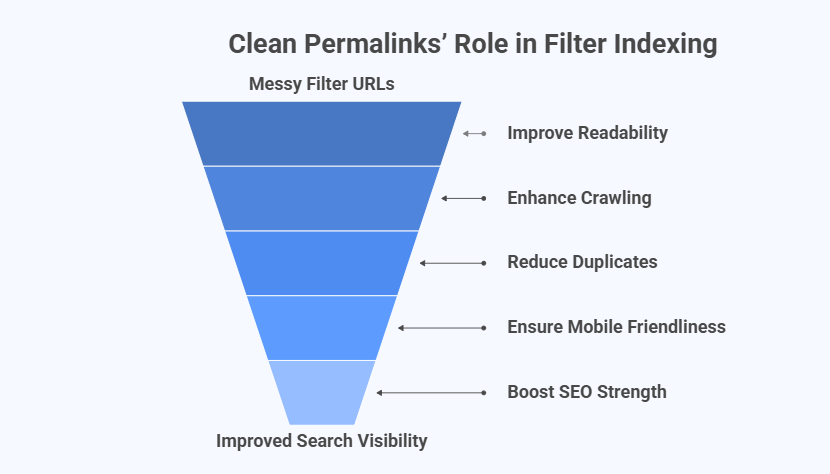
Easy to Read
Clean permalinks are short, simple, and describe the page clearly. They usually include product or category names instead of random letters and numbers. This makes it easier for both search engines and people to understand what the page is about.
Better Crawling
Search engines crawl clean URLs faster compared to messy query strings. A neat structure helps crawlers know the main content quickly without wasting time on confusing characters. This improves indexing and ensures important product pages get proper attention in search results.
Duplicate Control
Messy filter URLs often create several versions of the same content, leading to duplicate page issues. Clean permalinks reduce this problem by showing one clear version. This helps search engines know which page should be counted as the main one.
Mobile Friendly
Clean permalinks don’t just help desktop indexing — they also ensure that when someone applies a WooCommerce filter on mobile device, the resulting URL remains search-friendly. This means better consistency and higher chances of being indexed across all devices.
SEO Strength
Clean URLs improve click-through rates because users trust them more. They also support keyword placement in the link itself, which can give small SEO benefits. Overall, they make the site look professional and help pages perform better in search visibility.
Clean permalinks keep filter indexing simple and effective. By using them instead of messy query strings, you improve crawling, reduce duplicates, and make your store easier to find and trust in search results.
Should You Allow Google to Index All Filtered Pages?
Allowing Google to index all filtered pages can help increase visibility for your store. Each filter combination can create unique pages that target specific keywords. This might attract more visitors looking for very particular products. It can also boost your chances of appearing in different search results.
On the other hand, indexing every filtered page can lead to problems with thin or duplicate content. Many filter combinations might create almost identical pages with very little difference. This can confuse search engines, reduce overall page quality, and harm your website’s SEO performance over time.
A balanced approach works best. Instead of allowing all filter pages to be indexed, focus only on important filters that bring value. You can select popular product attributes or categories for indexing. This way, you gain visibility without overwhelming Google with low-quality or duplicate content.
FAQs About Can Filters Be Indexed by Google in WooCommerce Stores?
Filters in WooCommerce can be a great tool for shoppers, but many store owners wonder how these filters connect with search engines. The FAQs below will answer common questions about filter indexing, SEO impact, and how to make the most out of them.
Can Filter Pages Rank on Google?
Yes, filter pages can rank on Google if they are set up correctly. When filters are indexable, each filtered page can target specific keywords and show up in search results. This works well if the page shows valuable content instead of just repeating products. Having good titles and descriptions also helps in ranking better.
Do Filter Pages Slow Down a Website?
Too many filter pages can sometimes slow down a website. This happens when the server has to handle many requests at the same time. However, with a caching plugin or a good hosting provider, the impact can be reduced. Keeping only the important filter pages indexable also prevents extra load.
Can Indexing Filters Increase Store Traffic?
Yes, indexing selected filter pages can bring more traffic to your store. For example, a filter for “red shoes under $50” might attract visitors searching for that exact thing. By targeting such detailed keywords, you can reach people who are ready to buy. But this works best when done with proper SEO settings.
How Do Plugins Help With Filter Indexing?
Plugins make it easy to control which filter pages should be indexed. They allow you to enable or disable indexing with simple clicks, without needing coding. Some plugins even let you add custom titles and descriptions to filtered pages. This helps improve SEO while keeping everything user-friendly.
Are All Filters Good for SEO?
Not all filters are equally useful for SEO. Some filters, like color or size, may not add much value on their own. But filters that create unique product combinations or popular categories can be very useful. Choosing the right ones to index ensures better visibility without cluttering search engines.
Can I Use Canonical Tags for Filters?
Yes, canonical tags are helpful for filtering pages. They tell Google which version of a page is the main one, avoiding confusion with duplicates. If multiple filters show the same products, the canonical tag points to the best page. This improves SEO health and keeps indexing clean.
Should Filter Pages Have Unique Content?
It is always better if filter pages have unique content. Even a short description of the filtered products can make the page more useful to search engines. This sets it apart from other similar pages. Unique content also improves user experience, which can lead to more sales.
Do Indexable Filters Affect Mobile Search?
Yes, filters that are set to be indexable can also appear in mobile search results. This is important because many people shop directly from their phones. If the filter pages are mobile-friendly, they can bring even more traffic. Good mobile performance also helps ranking higher on Google.
Can I Block Some Filters From Indexing?
Yes, you can block unwanted filters from indexing. This is usually done through plugin settings, robots.txt, or using noindex tags. Blocking helps search engines focus only on important pages. This way, your crawl budget is not wasted on duplicate or low-value filters.
How Often Should Filter Settings Be Checked?
It is a good idea to review filter indexing settings from time to time. Online stores often change by adding new products or categories, and filter settings should match these updates. Checking every few months helps keep SEO in good shape. Regular reviews also prevent accidental indexing of unnecessary pages.
Final Consideration
Filters in WooCommerce are very useful for shoppers, but they also play a big role in how search engines see your store. When set up properly, filters can improve visibility and make your site easier to discover by the right audience online.
The common question many have is, can filters be indexed by Google in WooCommerce stores? The short answer is yes, but only with the right plugin and proper SEO settings. Without adjustments, they may create duplicate content issues that can harm rankings.
To get the best results, use clean permalinks, enable SEO options in your plugin, and avoid indexing unnecessary filter combinations. These small steps can save crawl budget, reduce duplicates, and improve visibility. Best wishes for making your store SEO-friendly.
